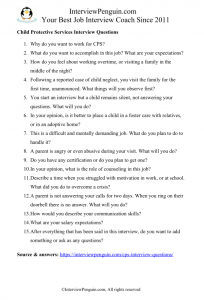Life is not easy for many people. They work a lot, struggle with bills, experience problems in relationships, and are often addicted to illegal substances. Regretfully, children typically pay the price. They cannot protect themselves, and fall victim to neglect or abuse. CPS social workers do not have it easy either. It is mentally demanding to visit families in crisis on a daily basis. What’s more, taking a child from a parent who probably wanted to provide better care but could not, can also leave its toll on one’s psyche.
Nevertheless, you can find a meaningful purpose in this job, and do a lot of good for the society, or at least local community. Hats down that you opted for it. Let me show you some questions you may face while interviewing for a job of a CPS social worker.
Table of Contents
Why do you want to work for CPS (as a conservatorship worker)?
Meaningful purpose is the obvious and a good answer. You should elaborate on it though. One thing is wanting to help neglected children (and families in crisis), another one having what it takes to do so. Ensure the interviewers that your education has prepared you for the role. What’s more, you are an excellent listener, and you can spot whether someone is telling the truth. Children generally trust you, and open up in front of you. And you have some mental resilience which will help you to handle what you will see in the job daily–the pictures that tend to stay in our mind.
To sum it up, you know why you want to have the job, and you also feel ready to do it well, after an initial training.
What do you want to accomplish in this job? What are your expectations?
The most important thing at this point is being realistic. It would be great if we could mend each broken family, if we never had to take a child from their parents. But that’s not how it works in the daily life of CVS Conservatorship workers…
You will often take a child from their parents, because you will have to. Counseling can help, but it can’t do miracles. Say that you do not have any expectations when it comes to end results of your work. You will try your best, in each meeting with the family, in each interview. And you know things will be tough, and you may hear many bad words from the parents.
But you count with that behavior, and the well-being of a child matters for you more than anything else. You want to do your job as good as possible–that’s what you want to accomplish. How it translates into the life of each individual family in crisis is hard to predict. You can also say that you expect a difficult job. Wearing pink glasses and being idealistic would only backfire later on.
* May also interest you: Case Manager interview questions.
How do you feel about working overtime, or visiting a family in the middle of the night?
Child abuse and neglect is not governed by standard working hours. Problems may arise at any time of the day, and you may be called to accompany a policeman to a flat in the middle of the night, on Saturday.
But this is not only your job, a place where you go to earn money. You consider it your calling, or personal mission if you want, and hence you are ready to answer a call of duty, at any hour. Ensure the interviewers that you won’t hesitate to rise from a bed when a well-being of a child is at risk.
Following a reported case of child neglect, you visit the family for the first time, unannounced. What things will you observe first?
First and foremost, you’ll observe the reaction of the parent. Do they let you in? Are they cooperative, or aggressive? How do they react when you tell them that you are from the CPS?
Once in (if they let you, in case that you don’t have a warrant from a judge), you will take notice of the condition of the house. Is it messy? Are there any traces of violence, such as broken things, clothes, etc? Where is the child? Basically you will try to notice any indication of child abuse or neglect. Once done, you will progress to the interviews.
You start an interview but a child remains silent, not answering your questions. What will you do?
This will happen often in your job. The child can remain silent for a variety of reasons, but the most common one is fear. They may be scared of their parents, or of you. Hence your goal is to help them overcome their fear. You can suggest different ways of doing so:
- Clearly explaining them who you are, and that they have no reason to be afraid of you. You should do this in a simple language, one the child can understand.
- Ensuring them that they are safe as long as you are with them, and that there is no danger from the side of their parents or anyone else.
- You can try offering them a candy or a toy or basically anything that will demonstrate your friendly attitude, and help break the barrier.
You will try to help them open up, but if it doesn’t work and children still looks scared, and there are signs of neglect or abuse, say that you won’t take risks, and will take them with you (to a protective care).
In your opinion, is it better to place a child in a foster care with relatives, or in an adoptive home?
It may seem obvious to suggest foster care with relatives, but you should elaborate on your answer. Say that you will always consider several things before deciding:
- How the child feels, and what he or she prefers–if in a condition to express any preferences and to judge the situation realistically.
- What the relationship between the parents and the suggested caretaker is.
- The mental condition of a child.
- The readiness of the suggested relative to take care of a child–you (or one of your colleagues) will always interview them properly, ensuring that the child ends up in good hands.
Special Tip: Download the full list of questions in a one page long PDF, and practice your interview answers anytime later, even when offline:
This is a difficult and mentally demanding job. What do you plan to do to handle it?
You can suggest a few options at this point. One is trying to keep distance–though it is easier said than done. At the end of the day, you opted for this career because you feel for the children… So it won’t be easy to keep distance, to forget about your job once you return home from work. But you can at least try to do so.
Another option is focusing on effort instead of results. Say that you want to keep this mindset. You’ll try your best, day in day out, but you also realize that things are not entirely under your control. Some child may end up abused, and you may make wrong decisions. Because you are just a human being, not a God. But as long as you try your best and stay humble, you should manage to deal with the disappointment.
Sports, or any physical activity that induces endorphins, is also a good way of finding balance after a difficult day at work.
Last alternative is saying that you expect to feel bad sometimes, or even emotionally drained. But it’s a toll you are ready to pay, because this job means a lot to you, and you really want to help the children.
A parent is angry or even abusive during your visit. What will you do?
You should show two things in your answer: right attitude, and empathy.
Of course no parent is happy to see a CPS worker in front of their door. You understand it, and you respect presumption of innocence. Hence if they are angry at the start, and do not want to cooperate, you won’t overreact. You will explain why you came–to help them, not to take their child away, and you will try to pacify their anger.
If they continue with an offensive behavior, however, against you or against the child in your presence, you will call the law enforcement authority (if they do not accompany you already). Remember that you are a social worker, not a hero or a policeman. You are not allowed to carry a gun and you shouldn’t start a fight with anyone.
Other questions you may face while trying to get a job of Conservatorship Worker or other role with CVS
- Do you have any certification or do you plan to get one?
- In your opinion, what is the role of counseling in this job?
- Describe a time when you struggled with motivation in work, or at school. What did you do to overcome a crisis?
- Tell us about a time when you went above and beyond for someone.
- A parent is not answering your calls for two days. When you ring on their doorbell there is no answer. What will you do?
- What is the most difficult situation you’ve ever faced at work?
- How would you describe your communication skills?
- What are your salary expectations?
- What do you consider your biggest weakness when we talk about case management and social work?
- After everything that has been said in this interview, do you want to add something or ask as any questions?
* Special tip: If you are not sure how to answer the questions, have a look at one of our eBooks, the Case Manager Interview Guide. It includes multiple premium answers to 25 most common case management interview questions, many of which you can face in your CPS interview, including the tricky scenario-based questions. It can be the part of the puzzle you are mission on your way towards a new employment contract…
Final thoughts
Interview for a job with CPS belongs to interviews with average difficulty. This isn’t a fancy job title which pays 100K annually, and you typically won’t compete with many other applicants for the position–which makes things a bit easier.
On the other hand, you may face several scenario based questions (just as I described in the article), and you will have to demonstrate right attitude to work, and readiness for all aspects of this job, including the mental strain it typically has on the social workers.
Try to prepare a short answer to each question, and do not forget to show positive attitude to your work. And if you are not sure how to do it, check our eBook, the Case Manager Interview Guide. I hope you will manage to prepare for all challenges this interview presents, and wish you best of luck!
Matthew
May also interest you:
- Social work interview – What are your strengths and weaknesses?
- Social work interview – Tell me about yourself.


